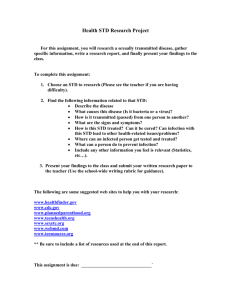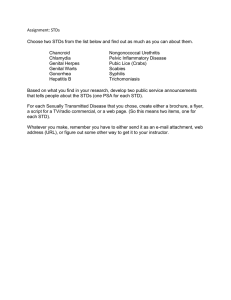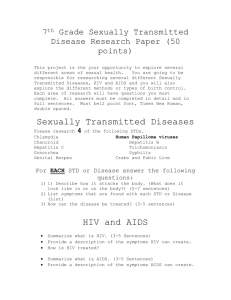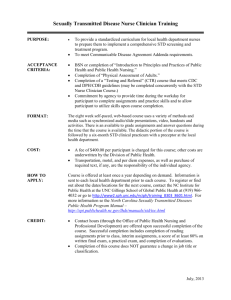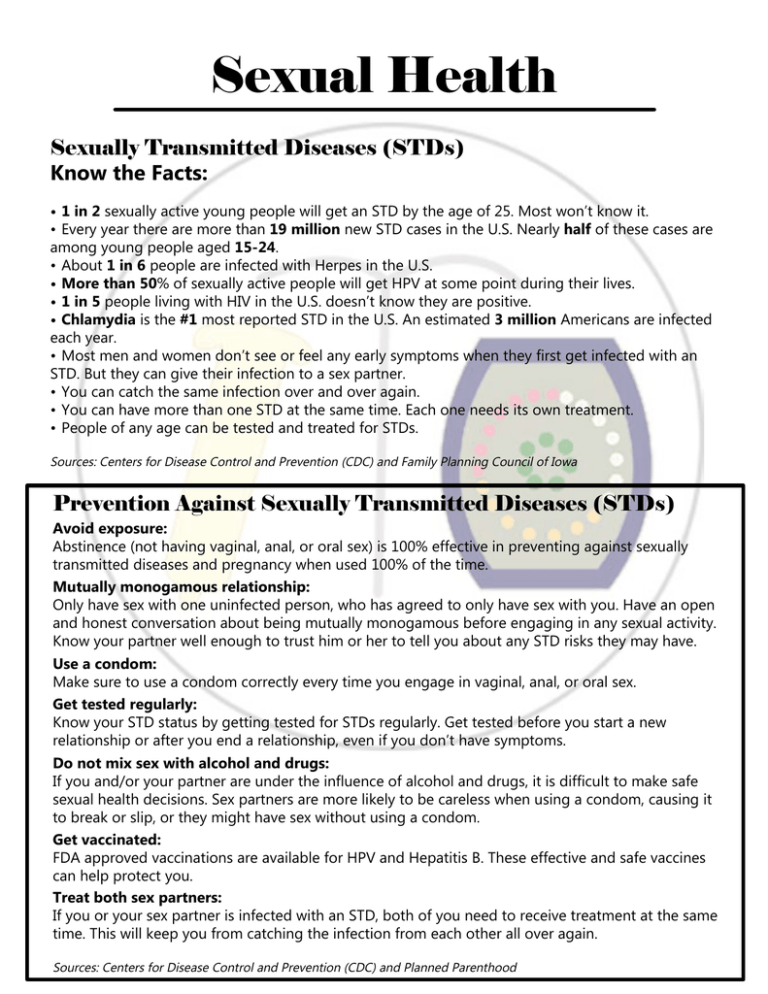
Sexual Health
Sexually Transmitted Diseases (STDs)
Know the Facts:
•1 in 2 sexually active young people will get an STD by the age of 25. Most won’t know it.
•Every year there are more than 19 million new STD cases in the U.S. Nearly half of these cases are
among young people aged 15-24.
•About 1 in 6 people are infected with Herpes in the U.S.
•More than 50% of sexually active people will get HPV at some point during their lives.
•1 in 5 people living with HIV in the U.S. doesn’t know they are positive.
•Chlamydia is the #1 most reported STD in the U.S. An estimated 3 million Americans are infected
each year.
•Most men and women don’t see or feel any early symptoms when they first get infected with an
STD. But they can give their infection to a sex partner.
•You can catch the same infection over and over again.
•You can have more than one STD at the same time. Each one needs its own treatment.
•People of any age can be tested and treated for STDs.
Sources: Centers for Disease Control and Prevention (CDC) and Family Planning Council of Iowa
Prevention Against Sexually Transmitted Diseases (STDs)
Avoid exposure:
Abstinence (not having vaginal, anal, or oral sex) is 100% effective in preventing against sexually
transmitted diseases and pregnancy when used 100% of the time.
Mutually monogamous relationship:
Only have sex with one uninfected person, who has agreed to only have sex with you. Have an open
and honest conversation about being mutually monogamous before engaging in any sexual activity.
Know your partner well enough to trust him or her to tell you about any STD risks they may have.
Use a condom:
Make sure to use a condom correctly every time you engage in vaginal, anal, or oral sex.
Get tested regularly:
Know your STD status by getting tested for STDs regularly. Get tested before you start a new
relationship or after you end a relationship, even if you don’t have symptoms.
Do not mix sex with alcohol and drugs:
If you and/or your partner are under the influence of alcohol and drugs, it is difficult to make safe
sexual health decisions. Sex partners are more likely to be careless when using a condom, causing it
to break or slip, or they might have sex without using a condom.
Get vaccinated:
FDA approved vaccinations are available for HPV and Hepatitis B. These effective and safe vaccines
can help protect you.
Treat both sex partners:
If you or your sex partner is infected with an STD, both of you need to receive treatment at the same
time. This will keep you from catching the infection from each other all over again.
Sources: Centers for Disease Control and Prevention (CDC) and Planned Parenthood
Common Sexually Transmitted Diseases (STDs)
•Bacterial Vaginosis (BV)
•Chlamydia
•Gonorrhea
•Viral Hepatitis
•Genital Herpes
•HIV/AIDS
•Human Papillomavirus (HPV)
•Pelvic inflammatory disease
•Syphilis
•Trichomoniasis
Birth Control Methods
*Abstinence is the only 100% way to
prevent pregnancy & sexually transmitted
diseases.
Most Effective
Implant (Nexplanon)
Intrauterine Device (IUD)
Male Sterilization & Female Sterilization
For information on correct and
consistent condom use, types of
condoms & do’s and don’ts of
condoms, visit the following
websites:
http://www.ashasexualhealth.org/sexual-health/all-about-condoms/
http://bedsider.org/methods/male_condom#details_tab
(Permanent)
The Shot (Depo- Provera)
Pill (Combination and Progestin-Only are the two types)
Patch (Ortho Evra)
Ring (NuvaRing)
Diaphragm
Male Condom
Female Condom
Withdrawal
Sponge
Fertility-Awareness Based Methods
Spermicide
Least Effective
For more information on the
transmission, prevention, and
treatment of sexually transmitted
diseases, visit the following
websites:
Centers for Disease Control and
Prevention:
http://www.cdc.gov/std/
American Sexual Health Association:
http://www.ashasexualhealth.org/stdsstis/
Planned Parenthood:
http://www.plannedparenthood.org/
learn/stds-hiv-safer-sex
Other Methods of Contraception:
LAM (Breastfeeding)
Emergency Contraception
Source: Centers for Disease Control & Prevention (CDC)
For information about each birth control method, visit:
Centers for Disease Control and Prevention: http://www.cdc.gov/reproductivehealth/UnintendedPregnancy/Contraception.htm
Planned Parenthood: http://www.plannedparenthood.org/learn/birth-control
Bedsider: http://bedsider.org/methods
Sexual Health Resources
Black Hawk County, IA STD/HIV Testing Centers
UNI Student Health Clinic
1600 W. 23 St.
Cedar Falls, IA 50614
319-273-2009
www.uni.edu/health
*Must be a current UNI student
*FREE gonorrhea and chlamydia testing
*Gardasil HPV vaccine available for women and men
UNI Health Clinic Resource Nurse
319-273-5161
It’s Your (Sex) Life
www.itsyoursexlife.com
Bedsider
www.bedsider.org
Planned Parenthood
www.plannedparenthood.org
Advocates for Youth
www.advocatesforyouth.org
I Wanna Know
www.iwannaknow.org
Black Hawk County Health Department
Black Hawk County Sexually Transmitted Disease Clinic
1407 Independence Avenue 5th
Waterloo, IA 50703
319-291-2413
http://co.black-hawk.ia.us/website_health/mainpage.htm
National STD and HIV Testing Resources
www.findstdtest.org / www.hivtest.org
Centers for Disease Control and Prevention
http://www.cdc.gov/std/
http://www.cdc.gov/reproductivehealth/unintendedpregnancy/contraception.htm
Allen Women’s Health
www.allenwomenshealth.org
Family Planning Council of Iowa
https://www.fpcouncil.com
American Sexual Health Association
www.ashastd.org
Allen Women’s Health
233 Vold Dr.
Waterloo, IA 50703
319-235-5090
800-435-2640
www.allenwomenshealth.org
Peoples Community Health Clinic
Waterloo Clinic
905 Franklin St.
Waterloo, IA 50703
319-272-4300
http://www.peoples-clinic.com
*Must become a client in order to receive services.
Planned Parenthood of the Heartland (Cedar Falls Center)
Cedar Falls Center
2520 Melrose Dr.
Cedar Falls, IA 50613
877-811-7526
www.ppheartland.org


